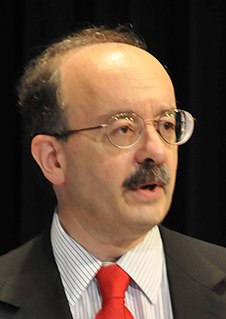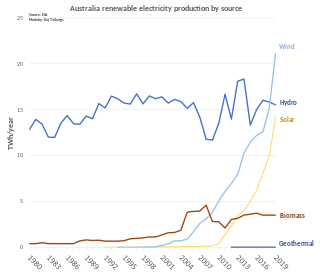
Sir Richard Charles Nicholas Branson is a British business magnate, investor, and author. In the 1970s he founded the Virgin Group, which today controls more than 400 companies in various fields.

Amory Bloch Lovins is an American writer, physicist, and chairman/chief scientist of the Rocky Mountain Institute. He has written on energy policy and related areas for four decades, and served on the National Petroleum Council, an oil industry lobbying group, from 2011 to 2018. In 1983, Lovins was awarded the Right Livelihood Award for "pioneering soft energy paths for global security". He was named by Time magazine one of the world's 100 most influential people in 2009.

José María Figueres Olsen is a Costa Rican businessman and politician. After he left the presidency of Costa Rica in 1998, Figueres has also been involved in global issues such as climate change, sustainable development, and technology. He started his career as an engineer working in agribusiness. After a decade, he entered public service as Minister of Foreign Trade and then Minister of Agriculture. In 1994, he was elected President of Costa Rica, as the nation's youngest elected president of the 20th century. In 2000, he joined the World Economic Forum in Switzerland, and later he worked with Concordia 21 in Madrid. Since 2010, he has been Chairman of the Carbon War Room, an independent non-profit organization focused on the global transition to a low-carbon economy. On 27 March 2012, Sir Richard Branson announced that he was appointed as the new President of the Carbon War Room.

RMI is an organization in the United States dedicated to research, publication, consulting, and lecturing in the general field of sustainability, with a special focus on profitable innovations for energy and resource efficiency. RMI was established in 1982 and has grown into a broad-based institution with 220+ staff and an annual budget of some $52 million. RMI's work is independent and non-adversarial, with a strong emphasis on market-based solutions. The institute, which includes the Carbon War Room, operates in a number of initiative areas: Electricity Platform, Renewables Solutions, Buildings, Reinventing Fire: China, Smart Island Economies, Mobility Transformation, Shipping Efficiency, Sunshine for Mines, Sustainable Aviation, and Trucking Efficiency. The work of RMI has benefited more than 80 Fortune 500 companies in a diverse range of sectors. RMI is headquartered in Basalt, Colorado, and also maintains offices in Boulder, Colorado, New York City, Washington D.C., and Beijing, China.
Hydrogen fuel is a zero-carbon fuel burned with oxygen; provided it is created in a zero-carbon way. It can be used in fuel cells or internal combustion engines. Regarding hydrogen vehicles, hydrogen has begun to be used in commercial fuel cell vehicles, such as passenger cars, and has been used in fuel cell buses for many years. It is also used as a fuel for spacecraft propulsion.

The Climate Group is a non-profit organization that works with business and government leaders around the world to address climate change. The group has programs focusing on renewable energy and reducing greenhouse gas emissions. Launched in 2004, the organization operates globally with offices in the UK (headquarters), the United States and India.
Business action on climate change includes a range of activities relating to global warming, and to influencing political decisions on global-warming-related regulation, such as the Kyoto Protocol. Major multinationals have played and to some extent continue to play a significant role in the politics of global warming, especially in the United States, through lobbying of government and funding of global warming deniers. Business also plays a key role in the mitigation of global warming, through decisions to invest in researching and implementing new energy technologies and energy efficiency measures.

A low-carbon economy (LCE) or decarbonised economy is an economy based on energy sources that produce low levels of greenhouse gas (GHG) emissions. GHG emissions due to anthropogenic (human) activity are the dominant cause of observed climate change since the mid-20th century. Continued emission of greenhouse gases may cause long-lasting changes around the world, increasing the likelihood of severe, pervasive, and irreversible effects for people and ecosystems.

The Virgin Earth Challenge was a competition offering a $25 million prize for whoever could demonstrate a commercially viable design which results in the permanent removal of greenhouse gases out of the Earth's atmosphere to contribute materially in global warming avoidance. The prize was conceived by Richard Branson, and was announced in London on 9 February 2007 by Branson and former US Vice President Al Gore. However, the prize was never awarded. In 2019, Virgin quietly took the prize website offline, after keeping 11 finalists suspended in expectation for 8 years. Al Gore had withdrawn from the jury earlier and commented that "He was not part of the decision to discontinue the contest.".

Renewable energy in Australia includes wind power, hydroelectricity, solar PV, heat pumps, geothermal, wave and solar thermal energy.

Jeremy Leggett is a British social entrepreneur and writer. He founded and was a board director of Solarcentury from 1997–2020, an international solar solutions company, and founded and was chair of SolarAid, a charity funded with 5% of Solarcentury's annual profits that helps solar-lighting entrepreneurs get started in Africa (2006–2020). SolarAid owns a retail brand SunnyMoney that was for a time Africa's top-seller of solar lighting, having sold well over a million solar lights, all profits recycled to the cause of eradicating the kerosene lantern from Africa.

Efficient energy use, sometimes simply called energy efficiency, is the goal to reduce the amount of energy required to provide products and services and can also reduce effects of air pollution. For example, insulating a building allows it to use less heating and cooling energy to achieve and maintain a thermal comfort. Installing light-emitting diode bulbs, fluorescent lighting, or natural skylight windows reduces the amount of energy required to attain the same level of illumination compared to using traditional incandescent light bulbs. Improvements in energy efficiency are generally achieved by adopting a more efficient technology or production process or by application of commonly accepted methods to reduce energy losses.

Fossil fuel phase-out is the gradual reduction of the use of fossil fuels to zero. It is part of the ongoing renewable energy transition. Current efforts in fossil fuel phase-out involve replacing fossil fuels with sustainable energy sources in sectors such as transport, and heating. Alternatives to fossil fuels include electrification, green hydrogen and aviation biofuel.
Greenhouse gas emissions by Australia totalled 533 million tonnes CO
2-equivalent based on Greenhouse Gas national inventory report data for 2019; representing per capita CO
2e emissions of 21 tons, three times the global average. Coal was responsible for 30% of emissions. National Greenhouse Gas Inventory estimates for the year to March 2021 were 494.2 million tonnes, which is 27.8 million tonnes, or 5.3%, lower than the previous year. It is 20.8% lower than in 2005. According to the government, the result reflects the decrease in transport emissions due to COVID-19 restrictions, reduced fugitive emissions, and reductions in emissions from electricity. There were however increased emissions from the land and agriculture sectors.
Beyond Zero Emissions (BZE) is an Australia-based, internationally recognised climate change solutions think-tank. The organization produces independent economic and public policy research on the transition of advanced economies to a zero emissions model. Beyond Zero Emission's stated research aims are to provide detailed pathways for a rapid transition in each major sector of Australia’s economy. The organisation is funded by donations from individuals and charitable trusts including the Lord Mayor’s Charitable Foundation and the Hamer Family Fund.

Carbon Nation is a 2010 documentary film by Peter Byck about technological- and community-based energy solutions to the growing worldwide carbon footprint. The film is narrated by Bill Kurtis. ASIN: B0055T46LA (Rental) and B0055T46G0 (Purchase).

Reinventing Fire: Bold Business Solutions for the New Energy Era is a 2011 book, by Amory B. Lovins and the Rocky Mountain Institute, that explores converting the United States to almost total reliance on renewable energy sources, such as solar energy and wind power. Lovins says that renewable energy is already cheaper than fossil fuels and his analysis predicts further reductions in renewable energy prices.
The B Team is a global nonprofit initiative co-founded by Sir Richard Branson and Jochen Zeitz. It advocates for business practices that are more centered on humanity and the climate.

Jigar Shah is the director of the Loan Programs Office of the US Department of Energy. Shah gained prominence as an American clean energy entrepreneur, author, and podcast host. Shah is known for work to create and advocate for market-driven solutions to climate change. He authored a book, "Creating Climate Wealth: Unlocking the Impact Economy" published in 2013.

Home energy upgrades from public utilities are added home energy efficiency and renewable energy features planned or installed by public utilities. Help from a public utility can make it easier for a homeowner to select, install or operate climate-friendly components. The utility might assist with coordinated use of utility-supplied energy, building features, financing, operating options and neighborhood supplied energy.















